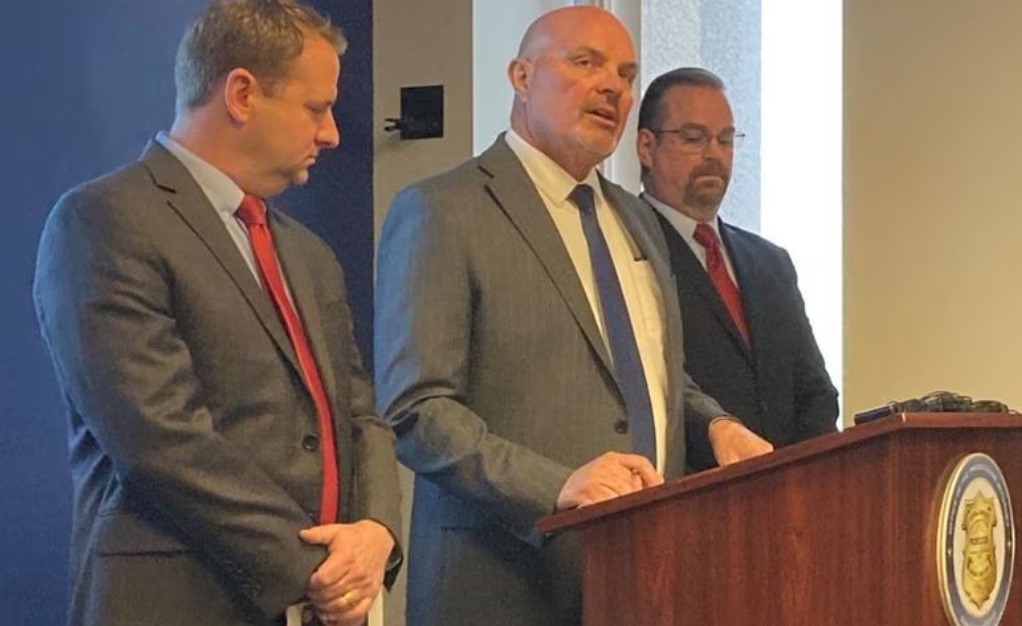
A leading cryptocurrency kiosk company conspired to profit from financial scams that preyed on the vulnerable, contributing to more than $3.5 million in illicit funds taken from the pockets of Northeast Ohioans in 2021, authorities announced Thursday.
Sonny Meraban, the owner of Illinois-based SandP Solutions, was indicted Wednesday by a Cuyahoga County grand jury on a host of financial crimes following a two-year federal investigation. Also indicted were Meraban’s father, Reza; an associate, William Suriano, and the company itself, which does business as Bitcoin of America.
The probe, led by the U.S. Secret Service, resulted in the seizure Wednesday of 52 kiosks across Cuyahoga and Lorain counties, mostly from gas stations, Cuyahoga County Prosecutor Michael O’Malley told reporters. A search warrant was also executed on Bitcoin of America’s office in Lisle, Illinois.
Sonny Meraban, 45, was arrested Wednesday at his Miami Beach, Florida, residence, while Reza Mehraban, 75, and Suriano, 69, were arrested in Chicago.
The arrests, searches and kiosk seizures required more than 100 law enforcement officers, authorities said, noting that the investigation involved more than two dozen federal and local law enforcement agencies across several states.
“Obviously, this was a very complex operation,” O’Malley said.
Bitcoin of America is one of the largest cryptocurrency kiosk companies in the country, operating more than 2,100 kiosks in 31 states and transmitting a quarter billion dollars across the world last year, according to the Secret Service.
Officials began looking into the company in 2021, soon after the Secret Service’s Cleveland office started getting complaints of scams involving their kiosks, Blaine Forschen, special agent in charge of the office, said during Thursday’s press conference. The Secret Service has long investigated counterfeiting and other financial crimes.
The investigation soon became national in scope. Through robocalls and emails, scammers were persuading vulnerable Americans — including several elderly Ohioans — to deposit thousands of dollars into Bitcoin of America kiosks, to be converted into cryptocurrency and deposited into third-party accounts, Forschen said. The scammers would pretend to be government officials or soldiers stationed overseas seeking romance, for example.
For each transaction, Bitcoin of America kept 20% of the deposits, Forschen said. When victims complained about the thefts, the company ignored them, keeping the profits, he noted.
In Northeast Ohio, many of Bitcoin of America’s crypto conversions were legitimate, but investigators determined that the company was operating without a money transmission license, which is illegal, and retaining the same cut of 20%, prosecutors said. Moreover, the company falsely represented its third-party organizational structure to Ohio regulators to avoid detection, they added.
Investigators do not accuse Bitcoin of America of working directly with scammers. But Forschen said more than 300 complaints were filed with the Federal Trade Commission that alleged robocall scams, amounting to millions of dollars in just the past year — enabled by a crypto company that kept 20% of deposits.
Licensed cryptocurrency transmitters, prosecutors noted, provide safeguards to protect consumers and prevent such money laundering.
O’Malley’s office says it has evidence of eight victims from Northeast Ohio, but called that total the “tip of the iceberg.” Most were swindled out of anywhere between $10,000 and $15,000, it says, funding groups including a Russian crime ring and a neo-Nazi group.
The Merabans and Suriano face charges that include engaging in pattern of corrupt activity, conspiracy, money laundering and receiving stolen property. The top two counts carry maximum sentences of 11 and eight years.
Victims who believe they fell prey to a scam involving a Bitcoin of America kiosk should contact their local police station and file a complaint through the Federal Trade Commission website, Forschen said.




























